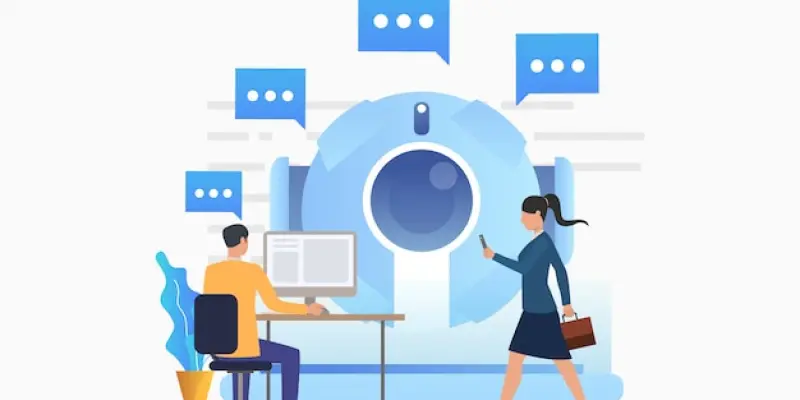The modern workforce is in constant evolution, characterized by the intertwining of technological advancements in daily professional activities. With the recent push for federal employees to return to their physical offices, the focus has shifted towards utilizing sophisticated technologies to track and monitor their presence. The deployment of technologies such as employee badge swipes, laptop login tracking, and artificial intelligence has sparked debates regarding privacy and work-life balance. These measures illustrate a growing trend emphasizing productivity and accountability while raising questions about the potential invasion of privacy.
Technological Integration in Monitoring
Badge Swipes and Login Tracking
The advent of advanced monitoring technologies, notably badge swipes and login tracking, marks a new era in federal workforce management. These technologies enable comprehensive data collection on employee attendance and location, facilitating compliance with office mandates. Various agencies, like the Environmental Protection Agency (EPA), have adopted these measures, urging employees to adhere strictly to office return policies. Administrators are tasked with verifying physical attendance, leading to potential disciplinary actions for non-compliance or inaccurate reporting. These actions echo concerns regarding the implications on employee autonomy and agency-wide uniformity in monitoring practices.
The centralized approach to badge tracking, while effective in ensuring security and accountability, is not consistently applied across all federal agencies. It illuminates a broader transition towards favoring in-office work driven by technological facilitation. This trend resonates with Elon Musk’s advocacy for traditional office settings, advocating for enhanced productivity. Yet, aligning with this technological advancement raises significant concerns among employees, worried about losing privacy and autonomy. As this integration progresses, federal workers remain apprehensive about potential ramifications of invasive supervision on morale and health.
Artificial Intelligence and Employee Surveillance
Artificial intelligence plays a pivotal role in advancing workforce surveillance by analyzing employee communications and optimizing work processes. AI’s introduction in digitizing records and automating workflows heralds transformational changes in how work is conducted and supervised. These advancements promise increased productivity, aiming to uphold workforce integrity through precise, data-driven insights. Yet, the widespread deployment of AI has not been without controversy. Privacy concerns persist among employees, who fear their communication and work habits might be closely scrutinized without explicit consent.
Additionally, experts in labor law suggest that transparency is crucial when implementing AI-driven monitoring systems. Employees must be informed of the extent and nature of surveillance to uphold ethical standards and foster trust. However, many remain disengaged from the technology’s surveillance capacities, potentially leading to privacy violations. Institutions like the Pew Research Center have raised alarms about inappropriate data usage, emphasizing the importance of maintaining control and defining proper boundaries. The integration of AI, while boosting efficiency, highlights the necessity for robust ethical frameworks ensuring adequate privacy and proper data handling practices.
Implications of Monitoring Measures
Federal Workforce Dynamics
The implications of these monitoring measures on federal workforce dynamics have been profound, nudging employees towards strict adherence to agency protocols. The unyielding focus on productivity has led employees to cautiously weigh their actions within the workplace, knowing their behavior is constantly scrutinized. Managers possess the authority to discipline employees, should they fail to comply with the specified monitoring mandates, adding layers of accountability within federal departments. With badges swiftly tracking movement and AI examining communication patterns, the boundaries of traditional workspace operations are being continually redefined, forging a future workforce inclined towards stricter oversight.
While these measures aim to cultivate productivity and efficiency within agency ecosystems, they also evoke apprehension among employees, concerned about overreach. The tension between fostering productivity and protecting employees’ privacy remains an ongoing debate. The discourse embodies both an opportunity for streamlined workflow and potential to disrupt foundational aspects of privacy and trust within the workplace. As employees navigate the intricacies of this nuanced balance, transparency and ethical considerations are pivotal, shaping the future interactions within federal enterprises.
Privacy Concerns and Ethical Challenges
The rapid incorporation of monitoring systems has opened up significant conversations surrounding privacy concerns and ethical challenges faced by federal employees. Adaptation to these technologies may entail significant privacy infringements, causing anxiety among the workforce. Ethical dilemmas arise with the potential for data misuse, questioning the authoritative handling of sensitive information. Employees may find their digital interactions subtly surveilled, raising a consensus about ethical oversight and necessitating policy reform to protect privacy.
While the technological monitoring holds potential for enhancing operations, it bears the risk of alienating employees, impacting morale negatively. The narrative around privacy breaches reflects broader societal concerns where personal data faces exposure without consent. As the monitoring systems become ingrained within federal agencies, shaping a transparent atmosphere emerges as the cornerstone of improving trust. By aligning with ethical norms and reinforcing privacy policies, organizations stand to foster a healthier workforce dynamic, reaffirming the core values of respect and integrity within employee relationships and agency operations.
Future Perspectives
The modern workforce is continually evolving, driven largely by technological advancements. As the push strengthens for federal employees to return to physical office spaces, a noticeable shift towards employing high-tech solutions to manage attendance is occurring. Technologies such as tracking employee badge swipes, monitoring laptop logins, and implementing artificial intelligence are front and center in this transition. These innovations are intended to boost productivity and enforce accountability, but they also ignite debates concerning personal privacy and work-life balance. On one hand, these technologies provide accurate insights into attendance and engagement levels. On the other hand, they raise concerns over whether these measures encroach too far into personal spaces, potentially infringing on individual privacy. Balancing the efficiency gains offered by technology with the need for safeguarding employee privacy is becoming a critical discussion point as workplaces navigate this modern landscape.

